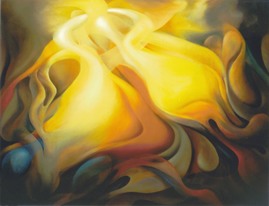
Do we need to take up new names as we wrestle with God in our lives? Not necessarily, of course, but when someone does, it may help remind us that, in Christ, we are always being made into a new creation. Such is part of the gift of transgender people I feel: helping us to explore afresh the trans in transfiguration. It is why, in several countries across the world, naming liturgies for transitioning people are being explored: as recommended, for instance, by the Church of England’s General Synod recently. For significant life changes can be the opportunity for each of us to share in deepening our awareness of what it is to become the transfigured body of Christ. Have you ever been to a wedding, for example, and seen and felt how the exchange of love and vows between a couple can also profoundly touch and renew the love and commitments of others gathered there? Such occasions can be symbols for everyone of what all our true identities and callings are.
The Gospel account of the Transfiguration is certainly intended both as a revelation of Jesus’ unique identity as the Son of God, and of our own calling and ultimate identity. In this story, the mystery of Christ is displayed. The appearances of Moses and Elijah, the two greatest prophets of the Old Covenant, are not incidental. Like the cloud and the glory, and the mountain itself, they tell the disciples that, in Jesus Christ, God’s transforming love is being recapitulated, renewed. Only, whereas Moses and Elijah shine with the reflected light of God, in Jesus Christ we see the eternal, uncreated, light disclosed. The disciples are present however as more than spectators to this truth. For the story also reveals Christ’s purpose. As the great teachers of the early Church put it, in Christ God became what we are (human), so that we might become what God is (divine). This is what Eastern Christians call ‘theosis’, or deification: becoming like, or in union with God. Just as the disciples are invited to climb the mountain with Jesus, so we too are invited to walk the Way of Christ so that we too may be changed, transfigured, by God.
So, in this sense, I love God’s invitation to be trans, transfigured. How about you? Are we, like the disciples, willing to follow Jesus and be transfigured by his glory? It is not always an easy pathway. The mountain can be steep. Passing through the cloud of unknowing is not easy. Even the light we see can be dazzling. For transformations are challenging journeys. Ask any kind of transfiguring person about that and they will tell you. Yet this is the route to our true identity. No wonder then that some have always preferred mere religion, or no religion, to being transfigured by the light and love of God. As Jacob found, it can hurt. We can be wounded in the struggle. Climbing life’s mountain, through suffering and loss, can also be a frequent trial of faith. Yet it is always to holy transformation that we are called, and God, in Christ, through the power of the Holy Spirit, is with us in the journey. Martin Luther, who knew a thing about transformation and re-formation, expressed it in this way:
This life, therefore, is not godliness but the process of becoming godly, not health but getting well, not being but becoming, not rest but exercise. We are not now what we shall be, but we are on the way. This is not the goal but it is the right road. At present everything does not gleam and sparkle, but everything is being cleansed.
(“Defense and Explanation of All the Articles”, transl. Charles M. Jacobs, in Luther’s Works, Volume 34 (Philadelphia: Muhlenberg Press, 1958), 24)
So what do you think the disciples saw in Jesus on the mountain? I think they saw a glimpse of his resurrected body. Indeed some scholars have even suggested this story is a misplaced Resurrection story. I suspect it is better viewed as an anticipation of what is to come, as well as a revelation of Jesus’ ultimate identity. It shows what Christ is to be, and what we, in Christ, are to be. For all the changes of our own earthly lives and bodies are nothing compared to the glory which is to be revealed in our resurrection bodies and ultimate transfiguration of our current identities. All we have in our earthly transformations are mere pointers, valuable though they may be for a season. In God, we are always more than we can ever possibly imagine. So may Christ grow in us that we may grow in Christ and become what we are called to be: transfigured creatures of God’s love, in the power of the Holy Spirit, Amen.
by Jo Inkpin, for Sunday 6 August 2017, Chapel of the Holy Spirit - Milton
 RSS Feed
RSS Feed